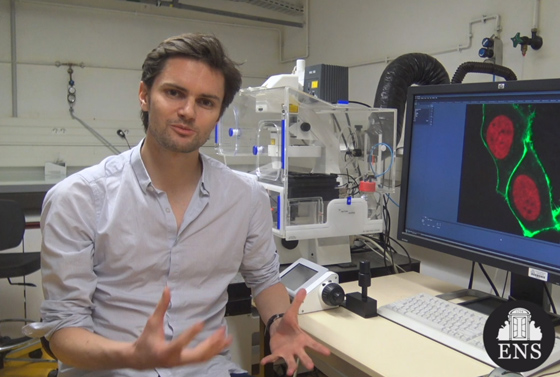Arnaud Gautier
Membre junior de l'IUF
Arnaud Gautier, Maître de Conférence au Pôle Chimie Biophysique du Département de Chimie de l'ENS, vient d'être nommé membre junior de l'Institut Universitaire de France (IUF), par arrêté de la ministre de l'Enseignement supérieur, de la Recherche et de l'Innovation en date du 6 avril 2018, et ce à compter du 1er octobre 2018, pour une durée de cinq ans.
Lauréat du financement ERC Consolidator Grant 2016, il a été récompensé de la Médaille de Bronze du CNRS 2017, notamment pour le développement et la mise au point de nouveaux marqueurs fluorescents pour l'imagerie biologique.
À la suite de stages postdoctoraux, qu'il effectue à l'École polytechnique fédérale de Lausanne et au Laboratoire de biologie moléculaire du Medical Research Council à Cambridge, Arnaud Gautier intègre le département de chimie de l'École normale supérieure de Paris comme maître de conférences. Parallèlement à sa mission d'enseignement, le jeune chimiste poursuit son projet de recherche : développer des outils chimiques innovants, notamment des méthodes de marquage des molécules, pour explorer de plus près les mécanismes biologiques. C'est ainsi qu'il met récemment au point une protéine dotée d'une fluorescence réversible, qui fonctionne comme un « interrupteur » et permet d'envisager l'observation de processus complexes impliquant un grand nombre d'acteurs, avec une précision inégalée
Ci-dessous son interview réalisée en 2016 par Nicolas Lévy, responsable de la communication du département de Chimie de l’ENS.

What is Chemical Biology?
Chemical biology gathers a community of scientists interested in science encompassing both chemistry and biology. Even though it originates from the accretion of several disciplines at the intersection of chemistry and biology (e.g. bioorganic chemistry, biochemistry, molecular biology and pharmacology), chemical biology now extends beyond these boundaries, reaching a point where some scientists define themselves as chemical biologists. The reasons why chemists and biologists find a common interest in chemical biology are complementary: on one hand, for chemists, the complexity of biological systems appears like the ultimate playground in terms of chemical reactivity and analytical challenges; on the other hand, for biologists, chemistry appears like the most appropriate level of description to unravel biological processes. This led to the creation of a dynamic scientific community interested in understanding and manipulating biological systems in new ways using the knowledge of chemistry. Chemical biology enables in particular the conception and discovery of powerful molecules to observe and virtually manipulate any cellular process, allowing for addressing biological problems that would otherwise remain elusive.
What is an ERC Consolidator Grant?
The european research council (ERC) is a European research agency, whose goal is to encourage the highest quality research in Europe and to support frontier research across all fields, on the basis of scientific excellence as sole criterion. One of the goal is to support the work of the next generation of research leaders in Europe.
The ERC Consolidator Grant aims at supporting young principal investigators to consolidate their independence. These grants are designed to back up researchers who want to establish their research teams and develop a successful career in Europe.
What is my project about?
My project aims at pushing the frontiers of biological imaging. Today, biological imaging is an essential tool to understand living systems, which are complex systems driven by a set of dynamic biological events that are tightly orchestrated from the single molecule level to the entire organism level. The project FLUOSWITCH aims at providing chemical biology tools to address current challenges in biological imaging, such as: (1) How to image a large number of biomolecules in single cells to address the full complexity of a biological system? (2) How to increase the spatio-temporal resolution of biomolecular imaging to better understand biological processes both in space and time? (3) How to image endogenous biomolecules in their native environnement with high sensitivity and minimal perturbation of the studied system? (4) How to map active cell circuits in a whole organism?
